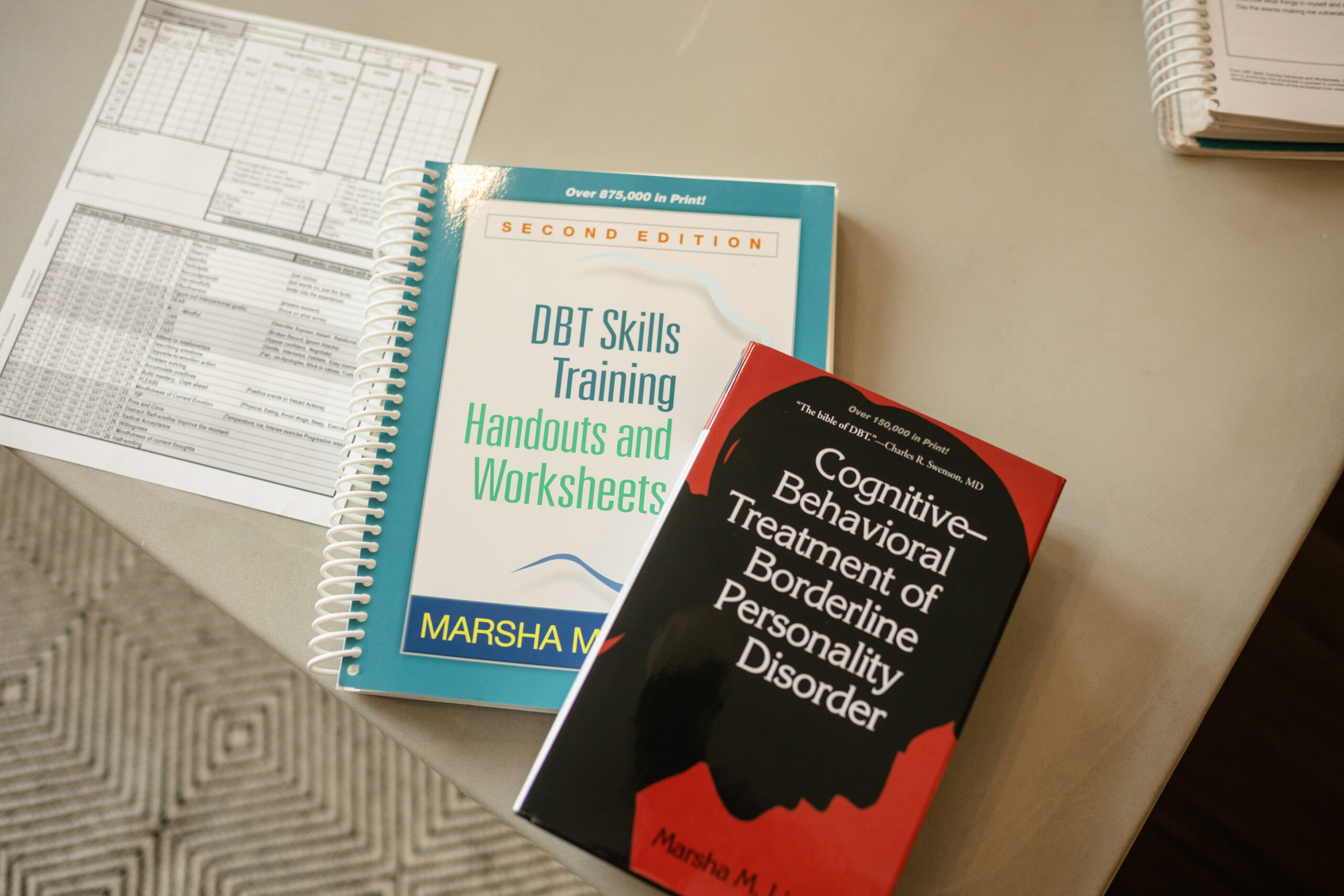Borderline Personality Disorder Treatment

What is borderline personality disorder (BPD)?
A pervasive pattern of instability of interpersonal relationships, self-image, and affects, and marked impulsivity, beginning by early adulthood and present in a variety of contexts, as indicated by five (or more) of nine symptoms:
Interpersonal Dysregulation
- Frantic efforts to avoid real or imagined abandonment
- Unstable & intense relationships (e.g., "rollercoaster relationships" where everything is perfect in one moment and terrible in the next moment)
Self Dysregulation
- Identity disturbance (e.g., lack of a strong sense of identity; the person does not know who they truly are; sudden & drastic changes in career, sexual orientation, religious beliefs, friends, and so on)
- Chronic feelings of emptiness (e.g., feeling that something is missing - this is different from feeling numb)
Behavioral Dysregulation
- Impulsivity in high-risk situations (e.g., impulsive sex, stealing, substance use, reckless driving, binge eating)
- Suicidal behavior & self-harm
Emotion Dysregulation
- Affective instability (e.g., anger, sadness, & anxiety)
- Inappropriate, intense, uncontrollable anger (e.g., even little things make the person very angry; they may throw things or hit people when angry)
Cognitive Dysregulation
- Stress-related paranoia & dissociation (e.g., when the person is experiencing significant distress, they might feel especially paranoid or experience dissociative symptoms)
What causes borderline personality disorder?
Dr. Marsha Linehan developed the biosocial theory, which posits that there is a transaction between the biology and the environment. On the biological side, the person with BPD is thought to have a biological predisposition to being sensitive to emotions. They tend to experience more extreme emotions and they have a slower return to their emotional baseline. Marsha Linehan equates it to having third-degree burns - if you even touch someone with third-degree burns, it's incredibly. The biology have transacts with an invalidating environment (e.g., parents, caregivers, siblings, teachers, extended family, peers, etc.), which is an environment that conveys to the person that what they're thinking and feeling is wrong, they shouldn't feel the way the do, and they should be able to just get over it, basically teaching them not to trust their own experiences. There is a vicious cycle that happens where the biology makes the invalidating environment more invalidating and the invalidating environment makes the biology more prominent, and these two transact to create significant emotion dysregulation.
What is the prevalence rate of borderline personality disorder?
Depending on the research study, prevalence rates range between 1.6-5.9% of the general population. Studies also indicate that approximately 10% of clients in outpatient mental health clinics and 20% of psychiatric inpatients meet criteria for BPD. Although some studies indicate that BPD is more prevalent amongst women, that idea has been challenged. There is a lot of thought in the field that many men fit criteria for BPD and may have been misdiagnosed with another personality disorder. Therefore, the prevalence of BPD may be more equal across genders.
There are a number of ways that a clinician can reach a diagnosis. Usually, there will be some sort of structured clinical interview administered by the treating provider or assessor. Assessments may include objective personality assessments, symptom measures, and observation over time. It is important that the assessor is able to measure the pervasiveness of the symptoms to be sure that what the client is experiencing is not just normal adolescent uncertainty or related to a particular time period.


It is important to seek treatment if you're finding that your symptoms are causing dysfunction or distress in your life. For a lot of people with BPD, it truly feels like they're living in hell, particularly if they're having thoughts of dying or acting on suicidal or self-harm urges. It is especially important to seek treatment if you're finding that your dysregulation is impacting major aspects of your life, like relationships, work, and school.
What are evidence-based treatments for borderline personality disorder?
Evidence-based treatments for BPD include Dialectical Behavior Therapy (DBT), Mentalization-based treatment (MBT), schema-focused therapy (SFT), and transference-focused psychotherapy (TFP).
DBT has a strong research backing for being effective with BPD, including at least 56 randomized controlled trials (RCTs) demonstrating DBT's efficacy. RCTs are the gold standard to prove the efficacy of a treatment and DBT has more RCTs than a lot of other evidence-based treatments, even outside the realm of treating BPD. Comprehensive DBT has four modes of treatment:
- Individual therapy where the client meets one-on-one with the therapist. The client will usually fill out a daily diary card where they're tracking their emotions, behaviors, and urges. The therapist and client use a personalized target hierarchy to help the client overcome the barriers to their goals.
- The DBT skills training group is usually 2-2.5 hours and meets weekly for approximately six months. That's where you learn the core skills. We have data that shows that the DBT skills are a huge part of what makes DBT effective. In DBT skills training, clients learn the four DBT skills modules:
- Mindfulness, where people learn how to take more control of their minds and be more present. For anyone in the world, not just people with BPD, we're often either thinking of the past or focused on the future, and we're not actually here now. Mindfulness helps us to be more aware and present because we can handle just this one moment. When we're thinking about all the stuff that can happen in the future, that causes more suffering. We can handle right now and when we have a good grasp on mindfulness, we can actually use the skills better.
- The distress tolerance module is all about how to tolerate the moment. If you can't solve a problem right then, you need to find a way to get through it, so you learn quick skills that will get you through the situation without making things worse.
- The emotion regulation module helps you learn more about your emotions: how to change your emotions, how to stop your emotions before they start, and what makes you more vulnerable to your emotions.
- Interpersonal effectiveness teaches you how to be effective with other people, including learning how to figure out and prioritize your goals in interpersonal situations, how to ask for something effectively or say no, how to maintain good relationships, and how to maintain your self-respect.
- 24/7 DBT phone coaching is a unique aspect of DBT that you don't see in other treatments. The idea is, we're asking you to stop self-harm and we're going to give you skills, but it's going to take some time. It would be silly to ask someone to stop problematic behaviors without giving them something in return. We truly believe that people need to learn how to use skills in all contexts of their lives. Therapists give clients the opportunity to call at any time for help using skills and that can really help move the therapy forward; it's a critical part.
- The DBT therapist consultation team is another unique aspect of DBT. Several DBT therapists get together every week to support each other in providing the treatment and help each other stay adherent to the treatment model. We really consider ourselves to be a community of therapists treating a community of clients, so a DBT client who is in adherent, comprehensive DBT is not only working with one clinician, they actually have a team of clinicians putting their experience together to help them.
Our clinicians are dedicated to and passionate about providing DBT according to the researched model. All of our clinicians receive extensive DBT training and participate in ongoing weekly training to continue to strengthen their skillsets. All of our DBT therapists are active members of our DBT consultation team. We are a community of therapists who treat a community of clients, and we'd love to welcome you into that community.
Team members who specialize in Borderline Personality Disorder (BPD) Treatment:
Samuel Eshleman Latimer | Maria Mangione | Desirae Allen | Robyn Williams | Samantha Ruwe | Eleanor Raker | Ashley Weber | Madison Beedon | Samantha Kassal | Nikki Winchester

To learn more about borderline personality disorder:
National Education Alliance for Borderline Personality Disorder (NEABPD): https://www.borderlinepersonalitydisorder.org
Books & Websites: https://dbt-lbc.org/index.php?page=101155
To learn more about DBT, visit our resources page.
If you find yourself experiencing intense suicidal thoughts, you should call 911, go to the closest emergency room, or contact one of the following hotlines:
National Suicide Prevention Hotline: 800-273-8255, https://suicidepreventionlifeline.org
Trevor Project for LGBTQIA youth: 866-488-7386, https://www.thetrevorproject.org
STAY CONNECTED
To receive updates on our therapy, community workshop, and clinician training offerings, as well as blog posts and other DBT information, sign up for our email newsletter.
SPREAD THE WORD
We are honored to be part of your mental health journey. If our services have made a positive impact on you, we encourage you to share your experience with friends, family, and colleagues who might also benefit. Your referrals are the highest compliment we can receive.
Thank you for helping us make a difference.
